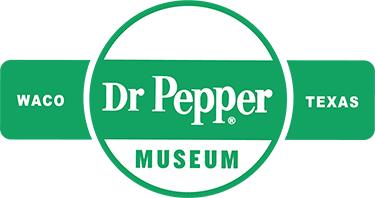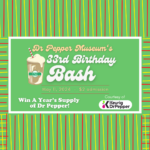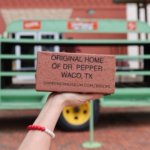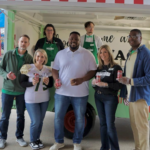 Up on the twelfth floor of the Amicable Building, Dad must have seen, heard, and felt the tornado as it slammed into downtown. I don’t know if he left early or waited until five o’clock. Nor do I know if others remained in the office with him. I do know, however, that when he left for the day, he did not take the elevator down to the first floor. I’ve read that the building didn’t lose power because it had an emergency generator, and so the elevator must have been working. I think it’s likely that when the elevator stopped at his floor, it was full of people. Rather than squeeze inside and wait for stops on the remaining eleven floors, he chose to take the stairs because he considered them a faster way down.
Up on the twelfth floor of the Amicable Building, Dad must have seen, heard, and felt the tornado as it slammed into downtown. I don’t know if he left early or waited until five o’clock. Nor do I know if others remained in the office with him. I do know, however, that when he left for the day, he did not take the elevator down to the first floor. I’ve read that the building didn’t lose power because it had an emergency generator, and so the elevator must have been working. I think it’s likely that when the elevator stopped at his floor, it was full of people. Rather than squeeze inside and wait for stops on the remaining eleven floors, he chose to take the stairs because he considered them a faster way down.
The stairwell of the Amicable Building was quite beautiful. I recall sitting on the marble steps, aware of the indentations in the marble from many footsteps; the smooth, graceful metal handrails; and the Art Nouveau light fixtures on the walls. Dad later described his descent as being in the dark. But the lights, or emergency lights, must have been on, and he would have had his cigarette lighter with him. Mother said that he helped “a hysterical woman” down the stairs. Perhaps their shadows made the stairwell seem especially dark. But I don’t think it was pitch black. Even so, it must have seemed like a very long way down.

On the ground floor, the woman ran out of the building, and Dad lost sight of her in the rain. He would have seen the buildings fallen into the street and felt a cold, hard fear that we were crushed beneath the rubble. Yet he remained calm. Perhaps he reverted to his military training. Although he later said he’d wanted to stay and help rescue people trapped beneath the bricks, his first responsibility was to us.
He expected to find Mother parked on 4th Street, so he made his way down the sidewalk along Austin Avenue to 4th. Blinded by the rain, he couldn’t see our car. If we weren’t buried under layers of brick on Austin, then we had to be somewhere along 4th. Since he had no way to know where we were, he re-traced the route he knew Mother would take, walking uphill all the way to Waco Drive. When he saw our car beneath the canopy, he must have felt enormous relief.
To Mother, it probably seemed like forever had come and gone. I can only imagine her joy when she saw Dad hurrying across Waco Drive toward us. I remember that his clothes and shoes were drenched, and he pulled out his brown leather wallet to show us that it was wet all the way through.
In 1993, when I returned to Waco, after a long hiatus, to attend Baylor, I drove the distance from 4th Street at Austin Avenue to Waco Drive and found that it was one-half mile. It probably seemed much farther to us, afraid but dry in the rain-pelted car, but probably not nearly as far as it did to my father, just recovering from polio, caught in a dangerous storm, soaked to the skin, refusing to fear the worst.
Mother never got over her terror of storms. In 1955, after the birth of my brother Dana, we moved to a house on North 27th Street near the intersection with Park Lake Drive. The house sat low on the descending creek terrace, surrounded by huge oak trees, and perhaps she felt safer at the bottom of that hill than up on the high ground of North 32nd Street. But any time the sky grew dark and threatening, we slid beneath our beds to wait for the impending storm to pass.
I don’t recall when Dad returned to work, but it must have been fairly soon after the storm. He told me once that the building had been designed to withstand 12 degrees of sway and had in fact tilted to 11 degrees. When we drove downtown after that, I would look up to see if I could see the building move, but of course, I couldn’t.
Mother didn’t return to work. Higginbotham Hardware Co., located in an old brick building on the original town square, had been destroyed by the tornado. Just before it struck, the employees were rushed into a large walk-in vault for safety and they survived. Mother, however, suffered from claustrophobia. Had Chip not burrowed into the garage and refused to come out for the housekeeper, and had Mother not gone home, she would have sought shelter from the tornado by ducking into the knee space beneath her desk. The collapsing store splintered her desk. And that is why I say my three-year-old brother saved our mother’s life. I can’t say that it was intentional, but I can say that angels were surely busy that day.
I’m afraid I don’t recall much about our housekeeper. I know that she got home safely, but I don’t know how much longer she worked for us. Perhaps she was glad to escape us.
Since May 11, 1953, I’ve learned to have a healthy respect for storms, but at unexpected times, I can dive under the bed (emotionally, anyway) with the greatest of ease. One night in 1993, when I had been home for a few weeks, I heard the Civil Defense warning siren blast forth, felt my blood pressure speed up, and started toward the shelter of the bathroom before realizing that the test siren was a normal occurrence. For several anxious minutes, though, I feared the approach of a tornado and wondered if I would survive it. Again.
After the passage of so many years, what do I remember most vividly? The sickening yellow-green sky. Dad’s wet wallet. The musty smell of a car seat. My parents’ courage.
Tom Brokaw got it right.
Berry M. Gerhardt died on November 11 (Veterans Day), 1963, at home. Evelyn R. Gerhardt lived until February 18, 1982. They are buried together at Waco Memorial Park. My brothers and I, and our families, carry on.




Leave a Reply